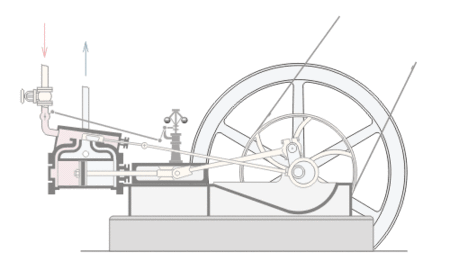
Is
this the world's largest insect? Anthony the giant 'Bulldog' ant is seen
here at the entrance to the Museum, with a young volunteer (Miss Ocean)
helper - who actually worked on the cart that Anthony sits on. 'Miss
Ocean' is a conservationist, keen on the country and rewilding, who also
hates ocean
plastic. But loves the humpback whales &
dolphins
that are forced to swim in our marine litter.
In
the fight against climate change, wood is good. There are too many
housing estates built of brick. Wood is a carbon lock, as timber grows
it captures carbon
dioxide, and converts it to a useful building
material. Building in wood is quicker and uses less energy. Hence,
reduces the greenhouse gases it takes to build in brick or steel.
Conversely,
the use of fossil fuels to power our economy
creates more greenhouse
gases than the planet can absorb. No matter how eco the building
materials. Fossil
fuels account for some 82% of CO2 in the Wealden District in
transport and homes.
Herstmonceux
Museum hosts an Innovation Hub, almost all of which exhibits
concern solar and electric vehicles. This is our contribution towards
Net Zero, in showing visitors how it is possible to think outside the
box, with the aim of inspiring climate engineers and entrepreneurs of
the future. Maybe even to inspire councillors and politicians yet to be
elected, that climate innovation should be nurtured and encouraged, with
demonstrable results in the form of three full size vehicles on display
with cartridge exchange (instant) refueling for BEVs and HFCEVs. This,
despite the innovator not receiving any kind of support from local
authorities. Imagine then the possibilities if future innovators are
supported. There is even a model of a hydrogen
truck refuelling station, derived from the cartridge based system,
named SmartNet™.
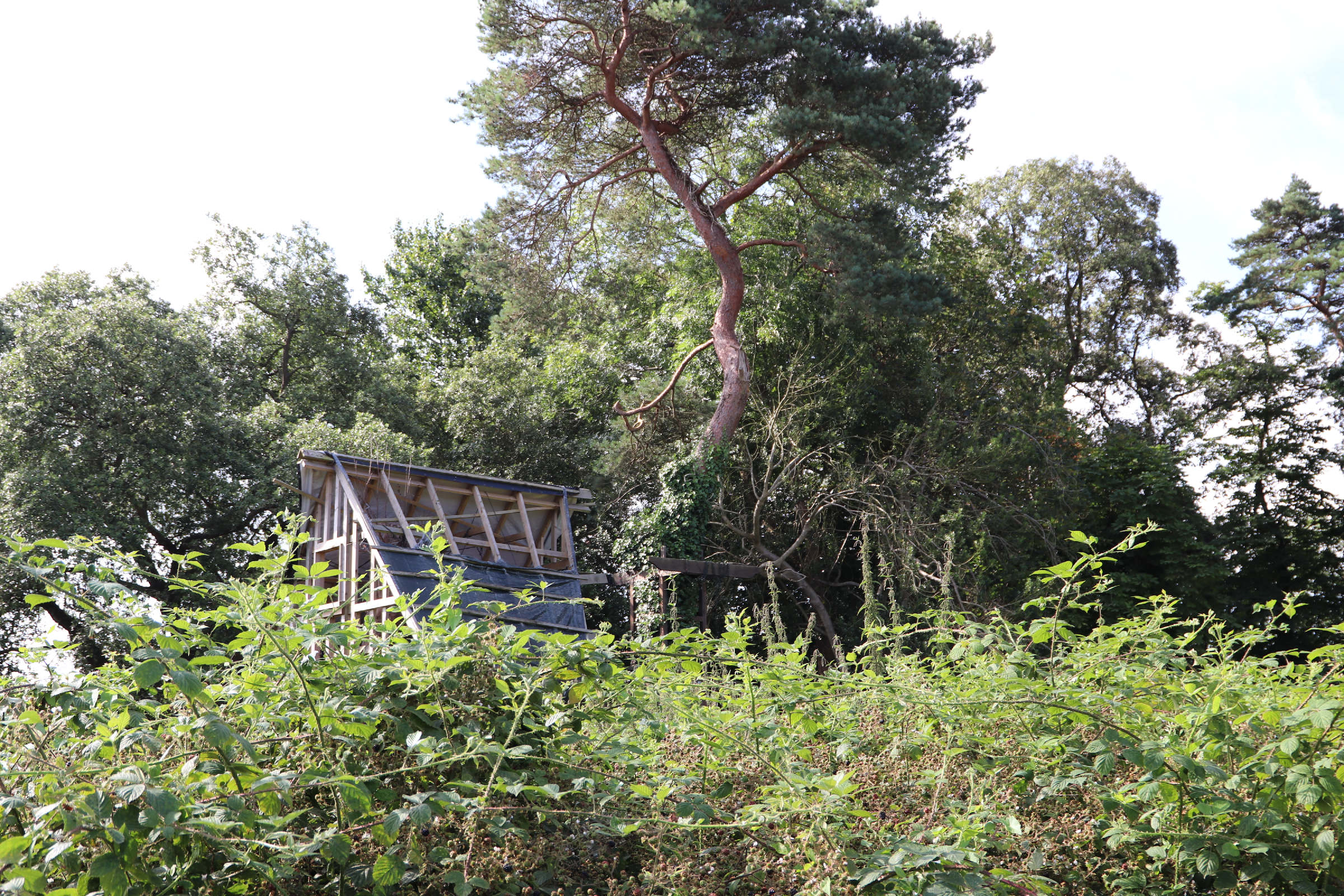
BLENDING
IN - This roof started out as a legal requirement under Health
& Safety Regulations. Since there is a requirement to protect
visitors to the museum and workers, from falling
branches and trees. That unfortunately, the Scots Pine species is
prone to. The Scots pine (Pinus sylvestris) is an evergreen conifer native to northern Europe. Mature trees grow to 35m and can live for up to 700 years. The bark is a scaly orange-brown, which develops plates and fissures with age. Twigs are green-brown and hairless.
Apart from falling branches, in high winds branches blown from adjacent
trees can be very dangerous. At present, the Museum has no beneficial
use to help pay for the upkeep of this important heritage asset. What is
at present protection for those working underneath, could well evolve
into an attraction
that generates an income for the Museum.
THE
SEVEN DEADLY SINS
The GHG inventory covers the seven direct greenhouse gases under the Kyoto Protocol:
- Carbon dioxide (CO2)
- Methane (CH4)
- Nitrous oxide (N2O)
- Hydrofluorocarbons (HFCs)
- Perfluorocarbons (PFCs)
- Sulphur hexafluoride (SF6)
- Nitrogen trifluoride (NF3)
These gases contribute directly to climate change owing to their positive radiative forcing effect.
HFCs, PFCs, SF6 and NF3 are collectively known as the 'F-gases'.
In general terms, the largest contributor to global warming is carbon dioxide which makes it the focus of many climate change initiatives. Methane and nitrous oxide contribute to a smaller proportion, typically <20%, and the contribution of f–gases is even smaller (in spite of their high Global Warming Potentials) at <5% of the total.
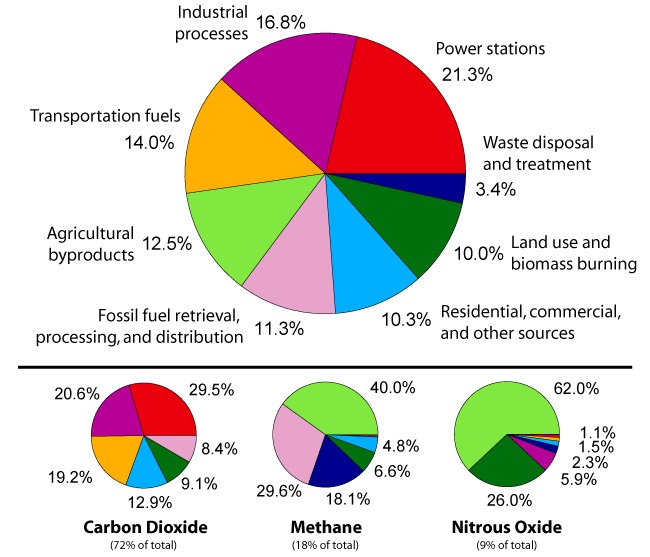
Also reported are four indirect greenhouse gases:
Nitrogen oxides (NOx)
Carbon monoxide (CO)
Non-methane volatile organic compounds (NMVOC)
Sulphur dioxide (SO2)
Nitrogen oxides, carbon monoxide and NMVOCs are included in the inventory because they can produce increases in tropospheric ozone concentrations and this increases radiative forcing (warming of the atmosphere). Sulphur dioxide is included because it contributes to aerosol formation which can either warm (through absorption of solar radiation on dark particles) or cool (from forming cloud droplets and reflecting radiation) the atmosphere.

TARGETS
Countries that have signed and ratified the Kyoto Protocol are legally bound to reduce their greenhouse gas emissions by an agreed amount. A single European Union Kyoto Protocol reduction target for greenhouse gas emissions of -8% compared to base-year levels was negotiated for the first commitment period, and a Burden Sharing Agreement allocated the target between Member States of the European Union. Under this agreement, the UK reduction target was -12.5% on base-year levels. The first commitment period of the Kyoto Protocol was from 2008 to 2012.
The second commitment period of the Kyoto Protocol applies from 2013 to 2020 inclusive. For this second commitment period, the EU and the Member States communicated an independent quantified economy-wide emission reduction target of a 20 percent emission reduction by 2020 compared with 1990 levels (base year) (“the EU2020 target”). The EU2020 target is based on the understanding that it will be fulfilled jointly by the European Union and the Member States. The EU2020 target is unconditional and supported by EU legislation in place since 2009 (The EU Climate and Energy Package). This Kyoto target covered the UK, and the relevant Crown Dependencies and Overseas Territories for whom the ratification is extended.
The Climate Change Act became UK Law on the 26th November 2008. This legislation introduced a new, more ambitious and legally binding target for the UK to reduce GHG emissions to 80% below base year by 2050, with legally binding five year GHG budgets. The independent Committee on Climate Change
(CCC) was set up to advise the UK Government on the setting and meeting of UK carbon budgets as well as monitoring progress against them scope and level of UK carbon budgets.
The Climate Change Act was amended in 2019 to revise the greenhouse gas emission reduction target for 2050 from 80% to 100%, i.e. net-zero.
Countries that have signed and ratified the Paris Agreement are asked to declare a Nationally Determined Contribution
(NDC), where countries set out what targets they intend to meet to contribute to mitigating climate change, and information on how the country plans to achieve those targets. The UK’s NDC commits the UK to reducing economy-wide greenhouse gas emissions by at least 68% by 2030, compared to 1990 levels.
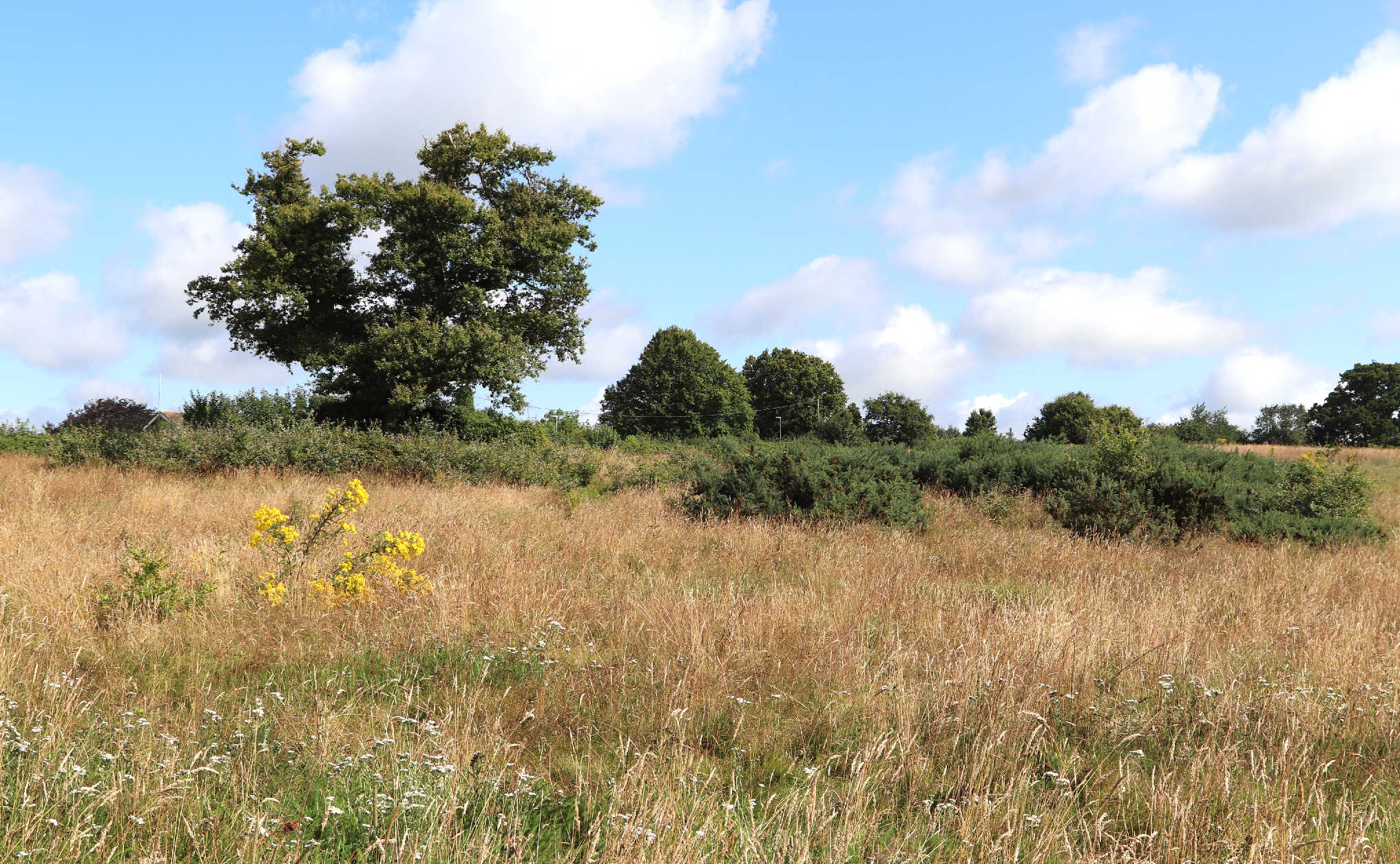
Now
that is what we call rewilding. The oak tree in the middle of this
field, and others dotted around the perimeter have been seeding rather
well. The tall grass and other shrubs are providing homes for much
wildlife. The hope is that, apart from footpaths and historic rights of
way, that this becomes a focal point for family walks, ramblers, hikers
and dog walkers in the village of Herstmonceux.
SOLAR
PANELS
As
with the use of timber, energy bills can be reduced, hence carbon
footprints, in installing solar
panels, that are now economical and
significantly reduce the cost of operating the Museum complex. Also
cutting emissions from greenhouse gases, when totally reliant on fossil
fuels for electricity
generation.
REWILDING
Rewilding can mitigate global
climate change by restoring ecosystems. An example of this would be rewilding pasture land, thereby reducing the number of cows and sheep and increasing the number of trees.
PLANTING TREES
Planting trees is the most efficient and scalable nature-based solution to fighting climate change and helping to achieve the Paris Agreement targets of restricting global warming to 1.5°C. Forests have great potential to help absorb more of the excess carbon dioxide (CO2) in the atmosphere as trees absorb it and store as carbon, making forests the largest land based carbon sink. Preserving and restoring forests is internationally recognised as being essential to helping fight
climate
change, but there is a surprising way that trees could help store more carbon, by cutting them down.
Although all plant matter absorbs carbon dioxide from the atmosphere, trees sequester (absorb and store) some of the carbon in their trunk, potentially storing it for hundreds of years. Uniquely the wood itself continues to act as a carbon store after the tree is felled and the timber is used in construction or the manufacture of furniture. Using timber in construction also reduces the carbon footprint of buildings compared to other building materials, meaning that wood offers great potential to revolutionise the greenhouse gas emissions of the construction industry.
SUSTAINABLE BUILDING
There is pressure on the construction industry to find alternative building materials because cement and concrete production account for 8% of global greenhouse gas emissions and the global iron and steel industry account for another 5%. It is estimated that half a tonne of CO2 is emitted to manufacture 1 tonne of concrete, and 2 tonnes of CO2 are emitted in the manufacture of 1 tonne of
steel. Wood is increasingly being considered as a viable alternative in both residential and larger building projects as it is the ultimate renewable material with multiple benefits for reducing carbon.
Firstly, the use of timber reduces the embodied carbon in a building, i.e. the
carbon footprint of the building’s creation, because there are lower emissions associated with its production.
Timber also acts as a carbon sink because it preserves the carbon that is stored in the wood, preventing its release back into the atmosphere as carbon dioxide. Sustainable forestry practices can ensure that felled trees are replaced and that new growing trees will continue to absorb
carbon
dioxide, increasing the carbon sequestration potential. If buildings are designed so that the disassembly and recycling of materials is incorporated into the initial plan, then the timber can be further reused. Any timber has these benefits that combine to make it a renewable source of material, but engineered
wood products extend the capabilities and carbon sequestration potential of timber even further.
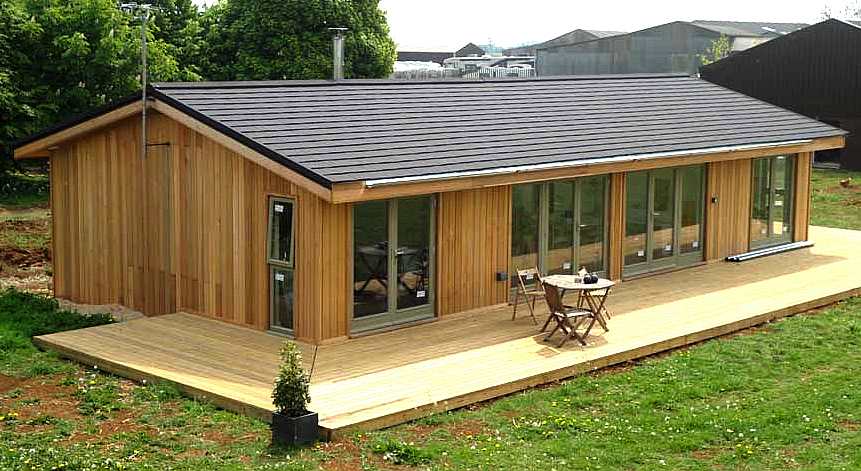
Timber
is versatile, recyclable and beautiful. A construction material working
with nature.
THE
KING'S SPEECH 17 JULY 2024
My Lords and Members of the House of
Commons, My Government will govern in service to the country.
My Government’s legislative programme will be mission led and based upon the principles of security, fairness and opportunity for all.
Stability will be the cornerstone of my Government’s economic policy and every decision will be consistent with its fiscal rules. It will legislate to ensure that all significant tax and spending changes are subject to an independent assessment by the Office for Budget Responsibility [Budget Responsibility Bill]. Bills will be brought forward to strengthen audit and corporate governance, alongside pension investment [Draft Audit Reform and Corporate Governance Bill, Pension Schemes Bill].
Securing economic growth will be a fundamental mission. My Government will seek a new partnership with both business and working people and help the country move on from the recent cost of living challenges by prioritising wealth creation for all communities. My Ministers will establish an Industrial Strategy Council. It is my Government’s objective to see rising living standards in all nations and regions in the United Kingdom.
My Ministers will get Britain building, including through planning reform, as they seek to accelerate the delivery of high quality infrastructure and housing [Planning and Infrastructure Bill]. They will also pursue sustainable growth by encouraging investment in industry, skills and new technologies.
My Government is committed to making work pay and will legislate to introduce a new deal for working people to ban exploitative practices and enhance employment rights [Employment Rights Bill]. It will seek to establish the appropriate legislation to place requirements on those working to develop the most powerful artificial intelligence models.
My Government believes that greater devolution of decision making is at the heart of a modern dynamic economy and is a key driver of economic growth and my Ministers will introduce an English Devolution Bill [English Devolution Bill]. Legislation will be introduced to give new powers to metro mayors and combined authorities. This will support local growth plans that bring economic benefit to communities.
A Bill will be introduced to allow local leaders to take control of their local bus services [Better Buses Bill]. My Ministers will bring forward legislation to improve the railways by reforming rail franchising, establishing Great
British Railways and bringing train 8 operators into public ownership [Passenger Railway Services (Public Ownership) Bill, Rail Reform Bill].
Taken together these policies will enhance Britain’s position as a leading industrial nation and enable the country to take advantage of new opportunities that can promote growth and wealth creation.
My Government recognises the urgency of the global climate challenge and the new job opportunities that can come from leading the development of the technologies of the future. It is committed to a clean energy transition which will lower energy bills for consumers over time. A Bill will be introduced to set up Great British Energy, a publicly owned clean power company headquartered in Scotland, which will help accelerate investment in
renewable energy such as offshore
wind [Great British Energy Bill]. Legislation will be brought forward to help the country achieve energy independence and unlock investment in energy infrastructure. A Bill will be introduced to support
sustainable aviation fuel production [Sustainable
Aviation Fuel (Revenue Support Mechanism) Bill]. My Government recognises the need to improve water quality and a Bill will be introduced to strengthen the powers of the water regulator
[Water (Special Measures) Bill].
My Government will seek to strengthen the border and make streets safer. A Bill will be introduced to modernise the asylum and immigration system, establishing a new Border Security Command and delivering enhanced counter terror powers to tackle organised immigration crime [Border Security, Asylum and Immigration Bill]. Legislation will be brought forward to strengthen community policing, give the police greater powers to deal with anti social behaviour and strengthen support for victims [Crime and Policing Bill, Victims, Courts and Public Protection Bill].
Measures will be introduced to improve the safety and security of public venues and help keep the British public safe from terrorism [Terrorism (Protection of Premises) Bill]. My Government will bring forward plans to halve violence against women and girls.
My Ministers will seek to raise educational standards and break down barriers to opportunity. Action will be taken to get people back in employment following the impact of the pandemic. A Bill will be introduced to raise standards in education and promote children’s wellbeing [Children’s Wellbeing Bill]. Measures will be brought forward to remove the exemption from Value Added Tax for private school fees, which will enable the funding of six and a half thousand new teachers. My Government will establish Skills England which will have a new partnership with employers at its heart [Skills England Bill], and my Ministers will reform the apprenticeship levy.
Legislation will be introduced to give greater rights and protections to people renting their homes, including ending no fault evictions and reforming grounds for possession
[Renters’ Rights Bill]. Draft legislation will be published on leasehold and commonhold reform [Draft Leasehold and Commonhold Reform Bill].
A Bill will be introduced to establish an independent football regulator to ensure greater sustainability in the game and strengthen protections for fans [Football Governance Bill].
My Government will improve the National Health Service as a service for all, providing care on the basis of need regardless of the ability to pay. It will seek to reduce the waiting times, focus on prevention and improve mental health provision for young people. It will ensure mental health is given the same attention and focus as physical health. My ministers will legislate to modernise the Mental Health Act so it is fit for the twenty first century [Mental Health Bill]. A Bill will be introduced to progressively increase the age at which people can buy cigarettes and impose limits on the sale and marketing of vapes [Tobacco and Vapes Bill]. My Ministers will also legislate to restrict advertising of junk food to children along with the sale of high caffeine energy drinks to children. A draft Bill will be brought forward to ban conversion practices [Draft Conversion Practices Bill].
My Government will take steps to help rebuild trust and foster respect. Legislation will be brought forward to introduce a duty of candour for public servants [Hillsborough Law]. A Bill will be introduced to establish a statutory Armed Forces Commissioner to act as a strong independent champion for our gallant Armed Forces and their families [Armed Forces Commissioner Bill].
Legislation on race equality will be published in draft to enshrine the full right to equal pay in law [Draft Equality (Race and Disability) Bill].
My Government will strengthen its work with the devolved governments in Scotland,
Wales and Northern Ireland so that the best outcomes possible are delivered for citizens across the United Kingdom. My Ministers will establish a new Council of the Nations and Regions to renew opportunities for the Prime Minister, heads of devolved governments and mayors of combined authorities to collaborate with each other.
My Government will continue to support the political institutions and devolved government in Northern
Ireland. In consultation with all parties, measures will be brought forward to begin the process of repealing and replacing the Northern Ireland Troubles (Legacy and Reconciliation) Act 2023 [Northern Ireland Legacy Legislation].
Measures to modernise the constitution will be introduced including House of Lords reform to remove the right of hereditary peers to sit and vote in the Lords
[House of Lords (Hereditary Peers) Bill]. My ministers will strengthen the integrity of elections and encourage wide participation in the democratic process.
The Government will propose a modernisation committee of the House of Commons which will be tasked with driving up standards, improving work practices and reforming procedures.
My Government will ensure a strong defence based on the North Atlantic Treaty Organisation’s common values of individual liberty, democracy,
human rights and the rule of law. Its commitment to NATO will remain unshakeable. It will maintain a strong Armed Forces, including the nuclear deterrent. To ensure that the United Kingdom’s defence capabilities are matched to the changing nature of global strategic threats, my Government will conduct a Strategic Defence Review.
My Government will continue to give its full support to Ukraine and its people and it will endeavour to play a leading role in providing
Ukraine with a clear path to
NATO membership.
My Government will seek to reset the relationship with European partners and work to improve the United Kingdom’s trade and investment relationship with the European Union. My Ministers will seek a new security pact to strengthen cooperation on the mutual threats faced by the
United Kingdom and the European Union.
My Government will play its part in trying to secure long term peace and security in the Middle East. It is committed to a two state solution with a safe and secure Israel alongside a viable and sovereign Palestinian state.
Later this week, my Government will host the European Political Community meeting at Blenheim Palace. The Queen and I look forward to our Visit to
Samoa alongside the Commonwealth Heads of Government Meeting in October, and our Visit to
Australia.
Members of the House of Commons
Estimates for the public services will be laid before you.
My Lords and Members of the House of Commons
Other measures will be laid before you.
I pray that the blessing of Almighty God may rest upon your counsels.

KING
CHARLES - PRO REWILDING & RENEWABLES
In
The King’s Speech
on the 17th July 2024, important first steps were taken to deliver the new UK Government’s agenda for nature and climate. Advanced renewable energy provision and tackling the cavalier, profit-maximalist approach by
water companies that has resulted in four in five of our waterways not being in good ecological condition are front and centre of the plans. And yet, with no nature-focused bill, there is an almost complete lack of priority given to the vital role of nature’s restoration at scale in our nation’s future.
In the UK we now have a huge opportunity to integrate our responses to the climate and nature emergencies and for the Labour government, in cooperation with the devolved administrations, to lead the way on this.
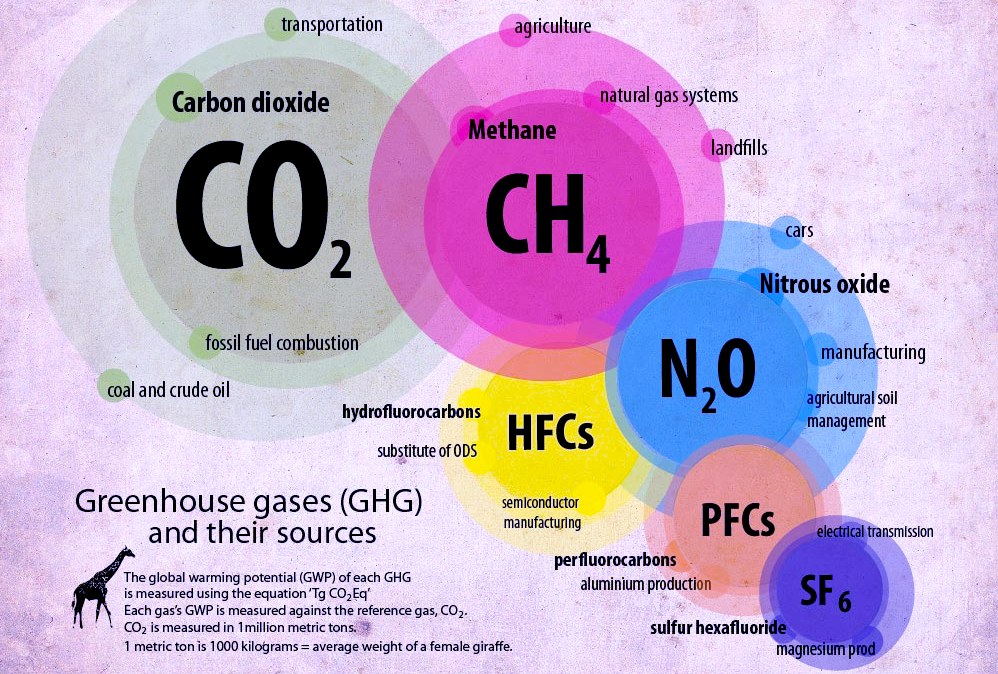
MAKING
THE LINK BETWEEN GLOBAL WARMING AND POLICIES
The Labour government’s emphasis on a green energy transition and creating good jobs in the industrial heartlands is exciting and progressive.
To deliver a truly
green economy we need to also consider the importance of a green land and marine use transition.
Agriculture alone currently produces 10% of the UK’s
greenhouse
gases. We know that rewilding 30% of Britain could help reverse that. It could sequester up to 53 million tonnes of CO2/year – equivalent to 12% of our current emissions – and make a significant contribution to achieving
net zero.
By switching to renewables we might save the planet from the perils of fossil
fuels.
We
hope that these guiding principles as to tackling climate change, coupled
with our technological exhibits might inspire generations of young
scientists, and conservationists to think outside the box, as the innovators appear to have come up with
some quite remarkable solutions, all in one geographical location. As some kind of
spontaneous think tank, inventive Mecca, or creative commune, where ideas
come to life. There is no reason you cannot do the same. Provided
the State nurtures such talent. The first step of which is recognising
the innovators in their midst, then assisting, rather than hindering
such creativity. Mostly, creative people are seen as a threat, because
they do not conform. Yet, conformity stifles creativity.
